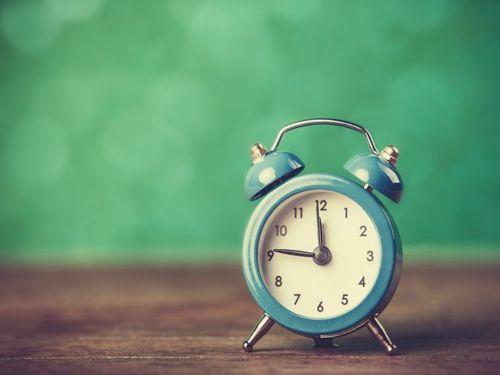What Time Should You Eat?

We’re all on different schedules and have different body clocks, and our hunger kicks in at different times. If you’re someone for whom the (lunch) bell doesn’t toll until 1:30 p.m. or who likes to dine after 9 p.m. like the Spaniards, is that a problem?
There is no right answer for everyone and no real schedule for when you should eat. What’s more important is knowing your body. “We don’t rely on our own body cues enough,” says New York University clinical associate professor of nutrition and food studies Lisa Sasson. “Be more in tune with your body. If you’re not hungry, don’t eat.”
What Sasson considers more important than what time you eat is what’s on your plate (or in your bowl). “To wake up and have a Coke and a doughnut is not going to do anything positive,” says Sasson. Instead she emphasizes that the meals you eat should be a balance of carbohydrates, proteins and fat. “If you have a piece of toast, an egg, and an orange, that will be more satisfying than a fruit shake,” says Sasson. “When you have a mixed meal it modulates [blood sugar] so the sugar is maintained and so you don’t have this drop, which gets you hungry.” Bottom line: A balanced meal will help stabilize glucose levels and eliminate that feeling of crashing.
Though we all have been reminded that breakfast is the most-important meal of the day, Sasson recognizes some people are not morning people. “I would never tell anyone not to have breakfast,” she says, “but someone may have a cup of coffee and then not eat breakfast until 11 a.m.” If you suddenly feel hungry soon after you ate your morning meal, that breakfast didn’t satisfy your needs. “If you have an apple for breakfast, that may not do it,” she says. “Having an apple with nuts will satisfy you longer, because nuts have proteins.” Sasson advises paying close attention to your body’s cues throughout the day. Look at the sugar levels in your foods, as they are usually the culprit for the highs and lows. “They cause a peak in blood sugar and then a plummet,” she says. “You want to modulate your blood sugar by eating healthfully.” Eating oatmeal for breakfast or a veggie soup like split pea paired with whole-wheat crackers at lunch are good examples. “Beans are great,” notes Sasson, “as they are soluble fiber, which especially modulates blood glucose levels.”
When and what you eat depends on each individual — both what was consumed and the person’s activity levels. “For most of us, with the exception of serious athletes, late-night snacking is a danger zone,” says Sasson. “Metabolism is all about calories, and it’s the amount of calories you consume.“ Therefore, those little snacks you sneak in after dinner can add extra calories to your day. Instead, opt for a healthy dessert like Peanut Butter Mousse or Fresh Fruit and Mint Salad and call it a night. “Before you go to sleep your body should be in a fasting state,” says Sasson.
If you do wake up starving, it may be time to examine your eating schedule. Or if you have no desire to eat breakfast, that could mean you overate the night before. Sasson suggests eating less at night and focusing on how that change impacts the way you feel the next morning. “Usually people feel better,” she says. If changing when and what you eat doesn’t change hunger levels, it could be a sign of a bigger problem. Hunger, fatigue and problems with urination are some of the first signs of diabetes, explains Sasson. She urges anyone who is experiencing those symptoms to make an appointment with their doctor..
If there is a time of day to watch out, for it’s 4 o’clock. “That’s when I tell people to eat something. If you ignore it then, you’ll be famished by dinner,” says Sasson. If you’re stuck at work, don’t go for the snack machine. “Bring something to work,” she suggests. “Crackers and cheese, fruit and nuts, yogurt, edamame or popcorn — anything non-perishable.” Giving yourself a boost in the afternoon won’t add more calories to your daily total; it actually may take some away. “It really helps to eat [at 4 p.m.] because you will make healthier choices at dinner. If you’re starving, you’ll eat the first thing you see,” says Sasson.
https://www.yahoo.com/health/what-time-should-you-eat-from-food-network-113879563423.html
Geen opmerkingen:
Een reactie posten